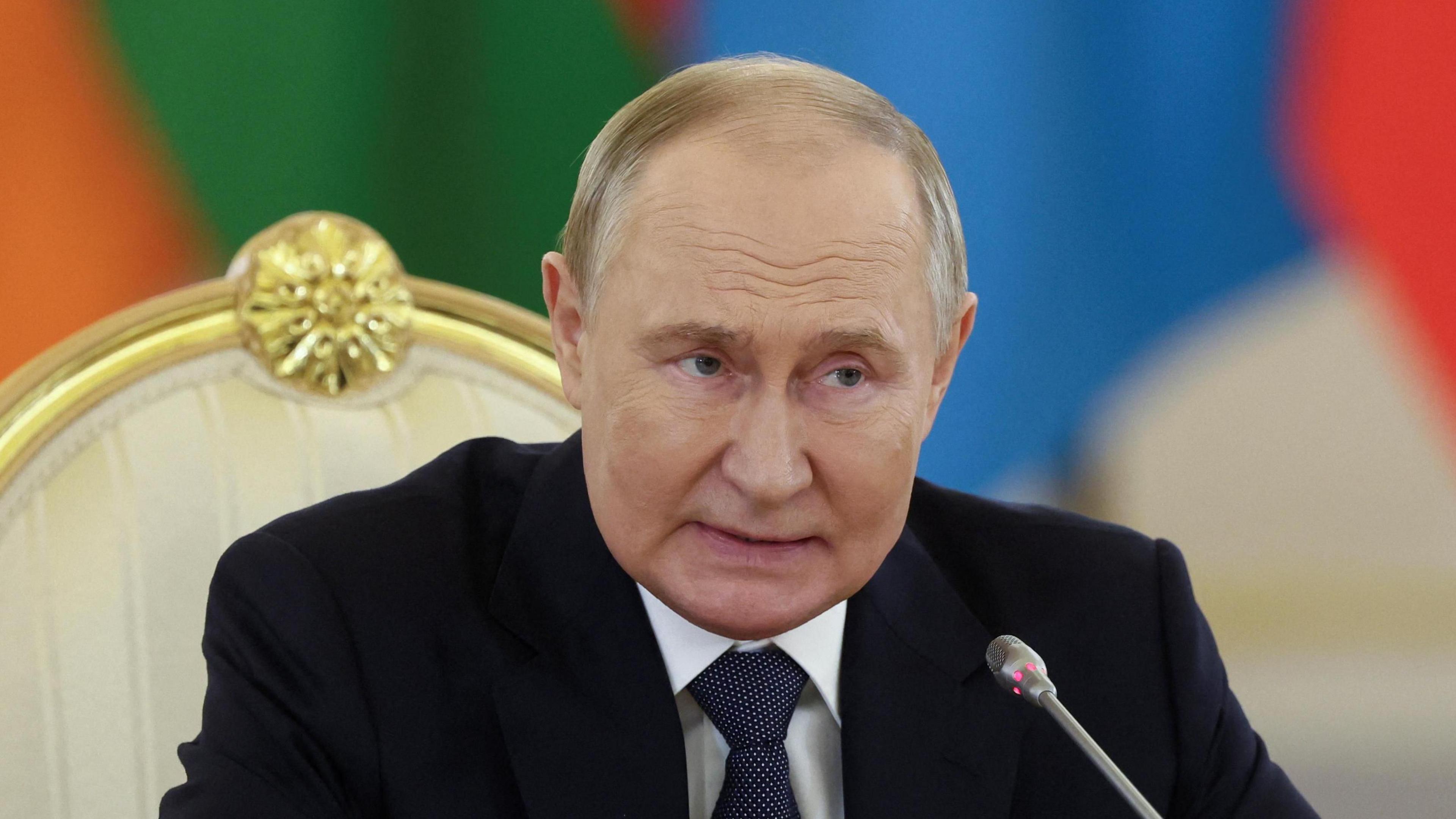UK-linked firms suspected of busting Russia sanctions

- Published
The government is carrying out 37 investigations into UK-linked businesses for potentially breaking Russian oil sanctions - but no fines have been handed out so far, the BBC can reveal.
The identities of the businesses are unknown but it is understood some are likely to be maritime insurance firms.
The Treasury said it would take action where appropriate, but pointed to the complexity of the cases as a reason they take considerable time.
But Sir William Browder, a longstanding critic of Russian President Vladimir Putin, said it was an "embarrassment" that there had not been a single prosecution or fine for companies investigated for potentially breaching oil sanctions.
Financial sanctions on Russia were introduced by the UK and other Western countries following the invasion of Ukraine in 2022.
The sanctions include a cap on the price of Russian oil, designed to ensure that oil can keep flowing without Russia making large profits.
The cap prohibits British businesses from facilitating the transportation of Russian oil sold above $60 a barrel.
Sir William, who heads the Global Magnitsky Justice Campaign, told the BBC the UK "was one of the most lax enforcers of these types of laws".
He added: "The UK doesn’t do prosecutions well and I don’t know if that can be fixed overnight.
"There seems to be both a resource problem and a culture problem when it comes to prosecuting people for economic crimes or sanctions evasion here."
Critics have claimed sanctions are ineffective after the latest figures showed the Russian economy was growing.
Data obtained by the BBC using Freedom of Information laws shows the Treasury has opened investigations into 52 companies with a connection to the UK suspected of breaching the price cap since December 2022.
As of August, 37 of those investigations were live and 15 had concluded, but no fines had been handed out.
Louis Wilson, the head of fossil fuel investigations at anti-corruption organisation Global Witness said it was “quite astonishing” that no fines have yet been handed out.
He described the oil cap as a “a sort of paper tiger” that is failing to crack down on rule breaking.
If the UK government “prevents British businesses from enabling Putin's profiteering, then I think you'll start to see others following that lead,” he added.
US widens Russia sanctions in banking crackdown
- Published13 June 2024
What are the sanctions on Russia and are they working?
- Published23 February 2024
Investigations into potential breaches of the oil cap and other financial sanctions are carried out by a Treasury unit called the Office of Financial Sanctions Implementation (OFSI).
OFSI received an extra £50m of funding in March to improve enforcement of the UK’s sanctions regime
But Mr Wilson said companies under investigation find it “pretty easy to come by” a document that gets them out of trouble.
He described the documents as “basically promises, voluntary bits of paper” and said they can be easily obtained even if the company was involved in transporting oil sold above the price cap.
“What's likely is either these businesses will find the paperwork that they need to get through this process, or we'll see the UK government drop these cases quietly,” he said.
He claimed the US were reluctant to make the Western sanctions regimes harder “because they're scared that if they do enforce the rules it will stop the Russian oil trade and that will send oil prices higher”.
Conservative shadow foreign office minister Dame Harriett Baldwin said sanctions were designed to “shut down the sources of finance for Russia's war machine” and “bring this illegal invasion to an end sooner”.
She said “there is probably more that could be done” by the government and the oil sector itself “because it does appear that UK importers are still bringing in oil that originated in Russia".
It is important that when OFSI “find deliberate wrongdoing they are exacting financial penalties,” she added.
A spokesperson for the Treasury said it would take enforcement action "where appropriate" and it was "putting sanction breachers on notice".
They added that the cap was reducing Russia's tax revenues from oil, adding that data from the country's own finance ministry showed a 30% drop last year compared to 2022.
The former chair of Parliament’s Treasury Select Committee launched an inquiry into the effectiveness of sanctions on Russia in February.
Dame Harriett said she “received evidence that the oil price cap is being evaded by refining Russian oil in refineries based in third countries and then the oil is being exported into the UK.”
Earlier this year the BBC reported on claims about how much oil this so-called “loophole” is allowing into the UK.
But parliamentary committees are disbanded once an election is called and the findings of the Treasury committee inquiry were never published.
It is understood no decision has yet been made as to whether the new Treasury Select Committee will recommence the work.
OFSI issued its first Russia-related penalty last month, when it fined a concierge company £15,000 for having a sanctioned individual on its client list.
London-based firm Integral Concierge Services was found to have made or received 26 payments that involved a person whose assets have been frozen as part of the Russia sanctions.